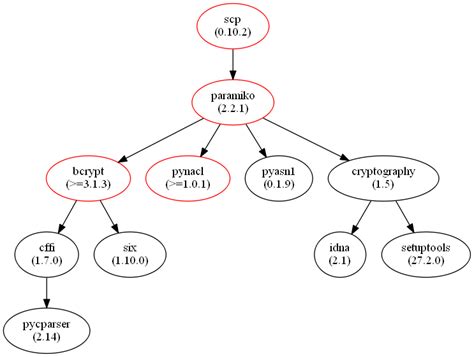Are you tired of manual file transfers and spending valuable time on repetitive tasks? Look no further than Paramiko, a powerful Python library that simplifies directory transfers and streamlines your workflow.
With its easy-to-use interface and robust capabilities, Paramiko makes it effortless to securely connect to remote servers, move files between directories, and automate routine tasks. Whether you’re a developer, system administrator, or data analyst, Paramiko can help you improve productivity and save time.
In this article, we’ll explore the benefits of Paramiko for directory transfers and show you how to get started using this versatile library. From setting up secure SSH connections to executing remote commands, we’ll cover all the essentials to help you master directory transfers with ease.
If you’re looking to simplify your workflow and streamline your file transfers, read on to discover how Paramiko can revolutionize your daily routines – you won’t be disappointed!
“Directory Transfers With Paramiko” ~ bbaz
Introduction
Directory transfers can be quite cumbersome, especially when dealing with large datasets. These transfers are integral parts of most data workflows and require a seamless approach to minimize efforts and time. One way to simplify such transfers is through the use of Paramiko. In this article, we’ll explore what Paramiko is, how it works, and how it simplifies directory transfers compared to other methods.
What is Paramiko?
Paramiko is a Python library used for implementing SSH protocol. It allows for secure encrypted communication between two remote computers over an unsecured network. With Paramiko, you can transfer files, run commands on remote servers, and manage infrastructure remotely. Paramiko is easy to install, comes as an open-source package, and can be installed via pip. You can also customize this library to suit specific needs, making it ideal for directory transfers.
Other Methods of Directory Transfers
Before we delve into how Paramiko simplifies directory transfers, let’s have a brief overview of some other methods commonly used for file transfers:
| Method | Advantages | Disadvantages |
|---|---|---|
| FTP | Easy to use, compatible with most systems | Not secure, low reliability |
| SFTP | Secure, provides encryption | Relatively slow |
| SCP | Faster than SFTP, easier to use | Not as secure, limited functionality |
How does Paramiko simplify directory transfers?
Paramiko simplifies directory transfers in several ways:
Encrypted Communication
As earlier mentioned, Paramiko enables encrypted communication between remote computers. This means that data transfers that would otherwise be exposed to attacks are secure and reliable.
Customizable Functions
Paramiko is highly customizable, allowing developers to tweak functionality according to their specific requirements. This flexibility paves the way for seamless data transfers between different platforms
Better Error Management
In case of an error during a transfer, Paramiko details the exact traceback of the error, making it easy to spot and correct the issue. Parameterized file operations reduce these errors and make it easier for administrators to troubleshoot when problems occur.
Efficient Data Compression
Paramiko applies efficient data compression techniques to minimize redundant information during transfer. This feature ensures that directory transfers happen faster and save space while reducing bandwidth consumption.
Easy Integration with Other Libraries
Paramiko integrates well with other libraries such as Fabric, Salt or Ansible which make workflow automation quite easy. Furthermore, Python developers can use Paramiko to help automate repetitive or difficult functions and streamline their workflow.
Conclusion
Effortless directory transfers are essential to any data management process. It helps keep workflows clean, organized, and productive. Through various features such as encrypted communication, error management, efficient data compression, and more, Paramiko helps simplify directory transfers beyond conventional approaches like FTP or SFTP. The result is fewer errors, higher productivity, and a better return on investment when managing data workflows.
Dear blog visitors,
Thank you for taking the time to read about the benefits of using Paramiko for effortless directory transfers. We hope that you found our article informative and engaging.
As we all know, transferring directories and files can be a tedious and time-consuming process, but with Paramiko, it has become much more streamlined and efficient. Its simple interface and powerful features make it a favorite among developers and system administrators alike.
Whether you need to transfer files between servers or automate your workflow, Paramiko can help you simplify your tasks and save valuable time. So why not give it a try today and experience the ease and convenience it has to offer?
Once again, thank you for visiting our blog and we hope to see you again soon!
When it comes to directory transfers, many people have questions about how to simplify their workflow. Here are some of the most common questions people ask about effortless directory transfers using Paramiko:
-
What is Paramiko?
Paramiko is a Python library that provides an easy way to connect to remote servers and transfer files securely using SSH (Secure Shell) protocol.
-
How can Paramiko simplify my directory transfers?
With Paramiko, you can automate your directory transfers by writing scripts that handle the entire process. This eliminates the need for manual transfers, saving time and reducing the risk of errors.
-
Is Paramiko difficult to use?
No, Paramiko is designed to be simple and easy to use, even for beginners. The library comes with clear documentation and examples that demonstrate how to use its various functions.
-
What types of file transfers can I perform with Paramiko?
Paramiko supports a wide range of file transfers, including uploading and downloading files, creating directories, and deleting files. You can also use it to execute commands remotely and interact with the remote server’s shell.
-
Is Paramiko secure?
Yes, Paramiko uses SSH protocol to establish a secure connection between the local and remote servers, ensuring that all data transferred is encrypted and protected from unauthorized access. Additionally, Paramiko includes features like host key verification and password authentication to further enhance security.




